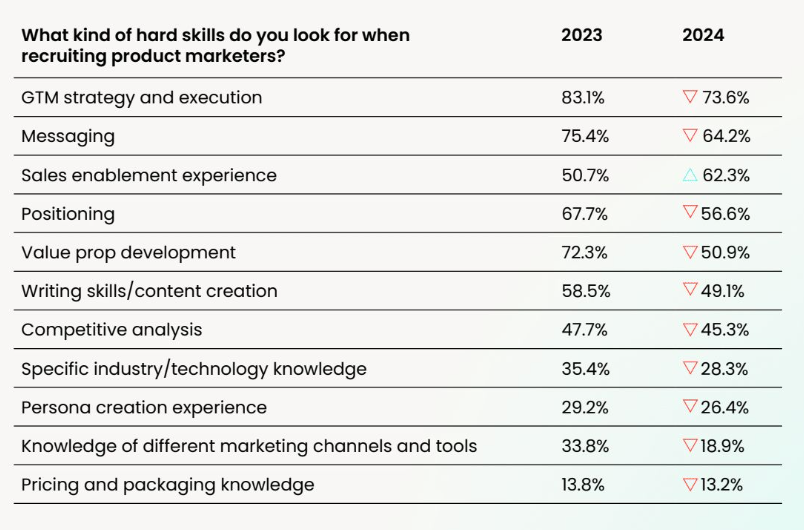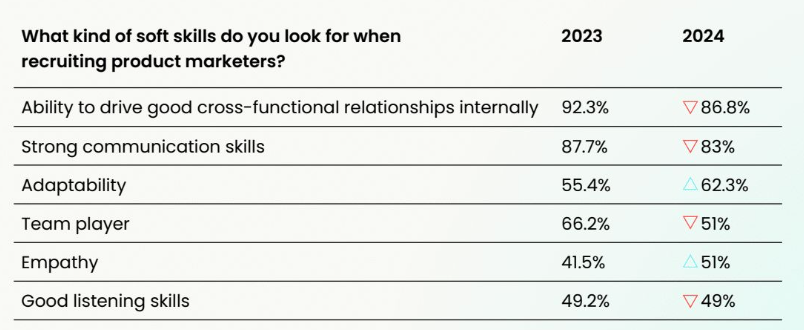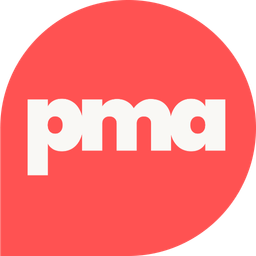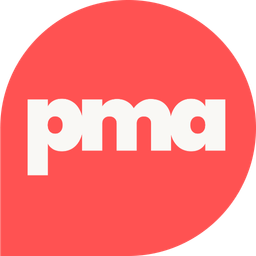It’s impossible to pinpoint one single product marketing skill that’s the most important among recruiters because needs vary.
While some are building the product marketing function from the ground up, others are developing their existing team and this influences which skills are prioritized.
Some employers will be on the lookout for skills in product positioning, for others it might be engaging messaging, whereas some will want to hone in on competitive intelligence.
Product marketing skills are as diverse as definitions of the discipline itself. Just because one employer may not value a skill as much as another, it’s essential to be as well-rounded as possible and identify critical hard and soft skills to climb the professional ladder.
So, in this article we'll be looking at:
- Valuable hard skills among recruiters
- Valuable soft skills among recruiters
- How to sell your product marketing skills
- Skills to highlight in product marketing interviews
- What product marketing skills do entry-level candidates need?
- How to improve career enhancement prospects
Valuable hard skills among product marketing recruiters
What hard skills do these leaders value most when hiring new prospects?
We put this question to our respondents in the State of Product Marketing Leadership 2024 report and found that 73.6% of leaders agree that GTM strategy and execution are the most important. This was followed by messaging (64.2%).
Sales enablement experience (62.3%) has surged significantly from the previous year, now ranking as the third most valued hard skill.
This growing emphasis on sales enablement aligns with what our leaders identified as their primary responsibilities, highlighting that enabling sales teams for success is a top priority for product marketing leaders in 2024/25.

We spoke with some leaders who gave us a bit more insight into these numbers:
“Because of my industry, I value industry-specific knowledge. If someone hasn’t worked in this exact industry, I look for product marketers who have experience in highly regulated technology because understanding that nuance is a transferable skill.
“I tend to prioritize the ability to create messaging, positioning, and value props because that is the most extensive work that my team performs and is a hard skill that resonates across product launch strategy as well as enablement efforts, plus can be used in partnership with marketing teams on integrated campaign planning.”
Melissa Vadasserril, Director of Product Marketing at JustWorks
“Only a minority of leaders look for writing skills when recruiting PMMs, down from 58.5% a year ago. This is smoking gun evidence on how powerful AI tools like Chat-GPT can be in democratizing writing skills turning all of us into superheroes.”
Nitin Kartik, Director of Product Marketing at Carbyne
Valuable soft skills among product marketing recruiters
While hard skills are crucial, soft skills can be even more essential, as they often can't be taught on the job.
Given the importance of soft skills, it’s only natural that we follow up by asking our leaders which ones they value most.
The ability to drive good cross-functional relationships internally has, again, taken the lead this year at 86.8%. This is a slight drop from the year before by 5.5%. This was followed by strong communication skills at 83%, adaptability at 62.2%, and being a team player and having empathy at 51% respectively. Good listening skills came in last at 49%.
Some respondents expanded and added their own most valued soft skills:
- Ask good/the right questions
- Honesty and integrity
- Fast learning and execution

Melissa Vadasserril, Director of Product Marketing at JustWorks said, “Cross-functional relationship building is, in my opinion, the most important soft skill. Why? Because as a leader, it’s harder for me to coach this than other soft skills, like adaptability and communication.
"If someone isn’t able to form relationships, that will limit their ability to be impactful in their role as well as show the value of product marketing across an organization.”

During our Product Marketing Insider podcast, we’ve also picked the brains of PMMs who’ve successfully interviewed for the top roles in the industry about which product marketing skills have helped them get to where they are today. Here’s what they’ve had to say:
Messaging and positioning
Sarah Din, SVP of Product Marketing at Quickbase
“I think one of the key things you need to nail right away is messaging and positioning, they’re core to any product marketing role. If you're not good at product messaging, you can’t do a product marketing role. So, be good at figuring out how to message to the right people at the right time.
“Product positioning is important too, especially if you're working in organizations that have multiple products or have a very competitive industry, so you need to nail how you position your products either complementary or against each other, however that is, or within a very competitive industry.”
Relationship-building
Elizabeth Brigham, Director at The Jay Hurt Hub for Innovation and Entrepreneurship at Davidson College
“Relationship building, hands down. That's the first thing I do when I go into any new company. I try to meet as many people as possible, I try to prioritize my time, obviously, with those with whom I would be working most closely, but understanding them at a very deep level, because without that trust initially going in, you're not going to be able to move quickly and get things done.”
Small group communication
Kerensa Hogan, former Director of Product Marketing at RingCentral, current GTM Strategist at Adobe
“Because product marketing is so responsible for cross-functional communication, small group communication as a skill is so important. PMMs rarely ever speak to an audience greater than maybe six people in a room, right? And a lot of the things we do, and I would add conflict resolution as a second skill, is we are communicating in a small group.
“More often than not, we're hosting that communication, because we're either trying to make people aware of something or we're trying to get people to consult on something.
"Generally speaking, we're often the drivers of this effort and workflow. So, the ability to understand the importance of small group communication and the dynamics of small group communication, and how to fundamentally lead a meeting, is so important.”
Jasmine Jaume, former Director of Product Marketing (Support and Platform) at Intercom, current Leadership and Performance Coach
“It's kind of cliche, but communication is so key in a product marketing role, as well as building relationships with different teams and knowing when something is happening - whether that's a feature announcement or a change to the UI or whatever it might be, knowing who that's going to impact and having an overview and being able to think about things like, which teams need to know about this?
"And then being able to communicate that clearly and concisely and relate it in a way that influences people, so knowing why it's important to them, and why they should care about it. I think good communication skills are kind of key and I don't think you'd get very far in a PMM role if you can't communicate well.”
Curiosity
Tamara Grominsky, former Chief Strategy Officer at Unbounce, current Founder of PMM Camp
“As a product marketer, you need to be data-informed with a real sense of curiosity, because no one's going to tell you what data to go look at, or what questions to ask. You have to have this sense of curiosity and kind of a desire to dig under the surface to identify trends and see what's happening with the customers.”
Organization
Jasmine Jaume, former Director of Product Marketing (Support and Platform) at Intercom, current Leadership and Performance Coach
“I'm big on organization, especially in a fast-moving startup environment, PMMs have to be very agile and flexible. Things come up, you know, there's a feature the product team wants to announce that you don't know about and you need to figure out how to fit it in.
"You need to make sure you're communicating with the right people. And when you're running things like big launches, organization is key to making those run smoothly. I like making lists and plans but whatever that looks like for you, just keeping organized and staying on top of things.”
Need help staying on top of your tasks? Take a spin through our top project management tools for product marketers.

Focus & prioritization
Div Manickam, former Director WW Services Marketing and Portfolio Management, DCG Services at Lenovo
“As a leader, and I think this is slightly different from an individual contribution, one of the big things for me is having that focus and prioritization. As I took on the role, I quickly realized that it's easy for us to let other teams tell us what to do, and that means you're just chasing project after project. So having that focus and prioritization was very critical.
“Making sure you have the discipline to say no is important too. As much as you want to be a team player and as much as you want to say “yes, I've got this” and try your best to not be underwater, you will be.
"You need to be able to know how much you can take on and always keep that 10 to 20% buffer - as idealistic as it may sound because there’ll always be projects that will be last-minute or a last-minute fire that we need to put down.
"And if we don't have that buffer then some other project is going to slip and you don't want to be the reason that happens. So only commit to things you can do and then the others just say no.”
Empathy
Samantha Yeh, Global Director of Product Marketing, Connected Fitness at Peloton Interactive
“I think empathy is a core skill to develop for product marketers, but it's not just empathy for the users, it's also empathy for the teams you need to involve and the decisions you rely on their expertise to help you resolve.
"I think one way we were able to elevate our level of influence in the organization was by better understanding those teams, our partners’ goals, and the things they think about a lot in their day-to-day.”
Product orientation
Francis Larkin, VP of Marketing at Clockwise
“We need people who can deeply understand these products because they are the subject matter expert internally for the marketing and the sales organizations.
"So, they need to be intensely curious, they need to be able to break down this product, and they need to be able to articulate it concisely to peers and customers. So strong product orientation and curiosity is a must.”
How to sell your product marketing skills
Breaking into product marketing and excelling in the field requires more than just acquiring the right skills.
You must also position yourself as the ideal candidate, whether transitioning into the role, moving up the career ladder, or bouncing back from rejection.
Abby Barsky, former Senior Product Marketing Manager at Cord and current consultant, shares her invaluable advice on navigating this dynamic field, offering tips on everything from building confidence to landing your dream role.
The product marketing career path: Is it defined?
Unlike traditional career trajectories, product marketing is still carving its path. According to Barsky, there’s no single "right way" to grow in this field.
Whether aspiring to become a VP of Product Marketing, transitioning into product roles like Chief Strategy Officer (CSO) or Chief Product Officer (CPO), or thriving as an individual contributor, the options are numerous.
Key skills for senior roles
Barsky highlights customer empathy and storytelling as critical skills for any product marketer:
- Customer empathy: Understanding customer pain points is foundational. This comes from user interviews, sales calls, surveys, and social media feedback.
- Storytelling: Draw inspiration from real-world narratives that resonate with you. What captures attention – a sense of mystery, honesty, or FOMO? Apply these elements in your messaging and product experience.

How to get noticed as a generalist
For marketing generalists exploring product marketing, showcasing transferable skills is key. Barsky advises:
- Network strategically: Leverage LinkedIn connections, join communities like PMA Slack or Sharebird, and build relationships with those in PMM roles. Connections often lead to opportunities.
- Reframe your experience: Tailor your resume to highlight PMM-relevant skills like persona development, content creation, and sales enablement. Treat your job application as a product marketing exercise—market yourself effectively!
Transitioning from social media to product marketing
Social media marketers looking to transition into product marketing can gain insight by observing PMMs in action. Barsky suggests:
- Learn from PMM communities: Platforms like PMA Slack offer a behind-the-scenes look at the challenges PMMs face.
- Expand responsibilities: Volunteer for tasks like joining user interviews or creating messaging frameworks. Such experiences strengthen your portfolio and prepare you for interviews.
B2B vs. B2C marketing: Bridging the gap
Transitioning from B2C to B2B marketing? Barsky says the principles remain the same: you’re still engaging with people.
- Focus on human needs: Understand the motivations and pain points of your audience, whether they’re consumers or business decision-makers.
- Leverage B2C experience: Fresh perspectives often help create standout campaigns in the B2B world.
Skills to highlight in product marketing interviews
@pm_alliance Preparing for your product marketing job interview? Here are the key hard and soft skills that product marketing leaders look for when hiring. #interviewtips #productmarketingtips #productmarketing #marketingcareer ♬ Calm LoFi song(882353) - S_R
If you're interviewing as the first PMM hire on a team, emphasize your ability to work independently and build processes from scratch.
For team roles, stress your cross-functional collaboration and communication skills. Always provide concrete examples of your contributions and leadership in previous projects.
Overcoming rejection
Barsky’s candid experiences with rejection offer valuable lessons:
- Seek feedback: Proactively ask interviewers for specific feedback to understand gaps in your application.
- Embrace persistence: External factors often influence hiring decisions. Focus on roles that align with your strengths and long-term goals.
Tackling imposter syndrome
Feeling out of place or doubting your skills? Barsky offers actionable advice:
- Track achievements: Regularly update a list of accomplishments to remind yourself of your growth and value.
- Ask for input: Colleagues can provide insights into your strengths, which can boost your confidence.
- Remember you’re not alone: Recognizing that imposter syndrome is common can help normalize the feeling and encourage resilience.
Continual skill development
No matter where you are in your career, Barsky emphasizes the importance of refining prioritization skills. As a PMM, you'll constantly weigh business goals, resources, and ROI. Balancing strategic and tactical efforts is key to success.
Barsky’s insights remind us that product marketing isn’t just about possessing the right skills – it’s about positioning yourself effectively, embracing growth, and persistently chasing opportunities.
Whether you’re a generalist, transitioning from another role, or climbing the career ladder, the right mindset and strategies can make all the difference.
What product marketing skills do entry-level candidates need?
Empathy, cross-functional communication, storytelling, research, and problem-solving were among the key skills deemed essential for entry-level PMMs by Daniella Latham, Principal Product Marketing Manager at Atlassian. She said:
“Product marketers come from diverse backgrounds, as the role typically requires a healthy mix of both creativity, problem solving and analytical skills. In any B2B or B2C company, you might find product marketers coming from sales, demand gen marketing, project management, or customer support.”

How to improve career enhancement prospects
Product marketing is an area with broad scope for professional development. Some common job titles for product marketers include:
- Associate Product Marketing Manager
- Junior Product Marketing Associate
- Portfolio Marketing Manager
- Digital Product Marketing Manager
- Product Marketing Manager
- Solutions Marketing Manager
With experience, PMMs can progress into more senior roles, including Senior Product Marketing Manager and VP of Product Marketing.
PMM Hired, PMA’s product marketing hub, gives you the tools you need to take control of your career and ascend the career ladder, including:
- Interview advice and examples
- Exclusive articles
- Frameworks
Built with brands like IBM, Amazon, Etsy, and Google Fiber (plus much more), PMM Hired breaks down the key steps in the product marketing career journey and provides specific and detailed content about how to improve your skills and increase your chances of landing that next promotion.


















 Follow us on LinkedIn
Follow us on LinkedIn






.svg?v=7c92ff3c51)